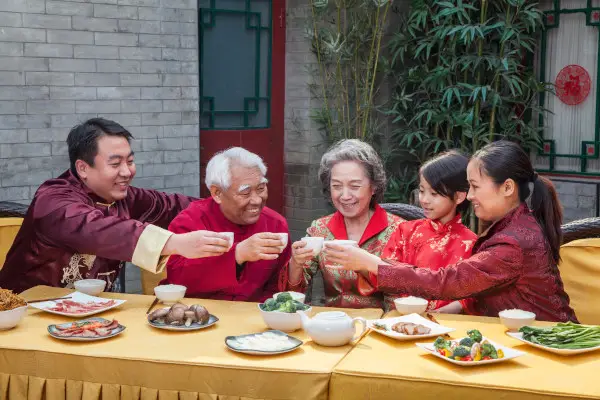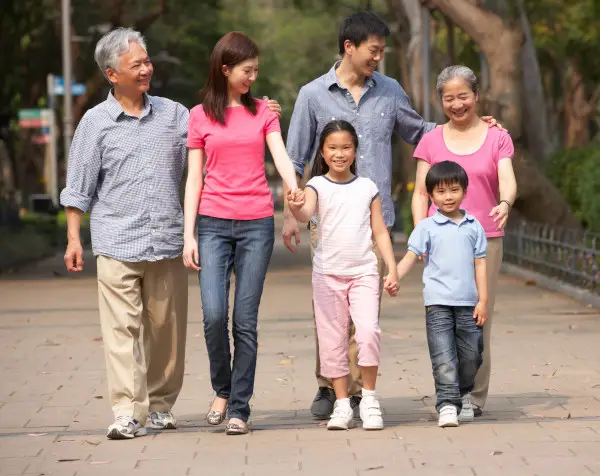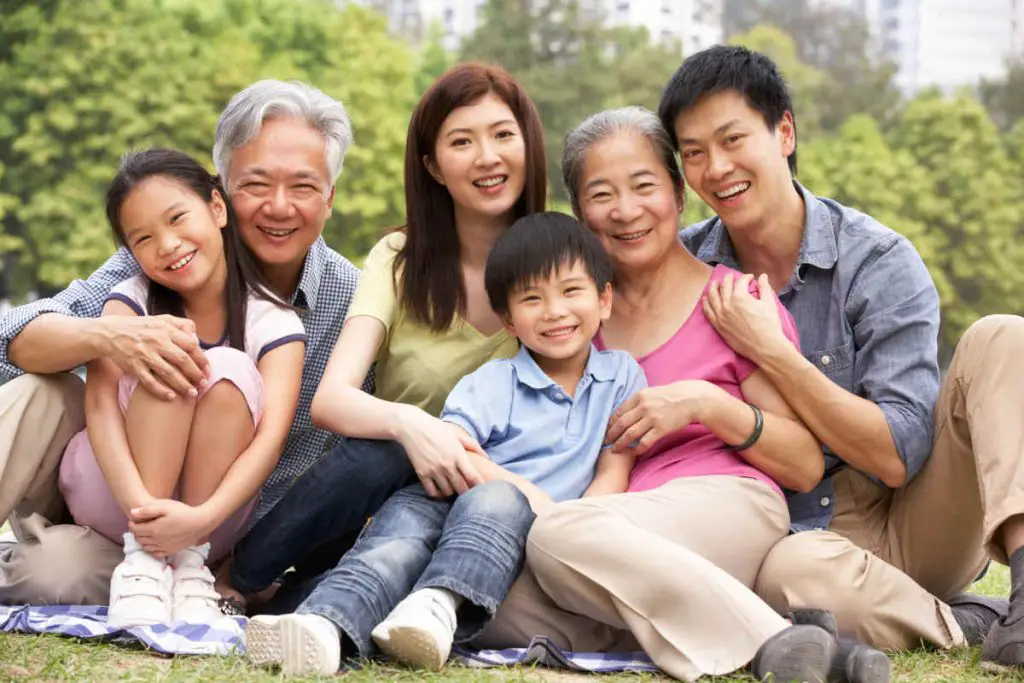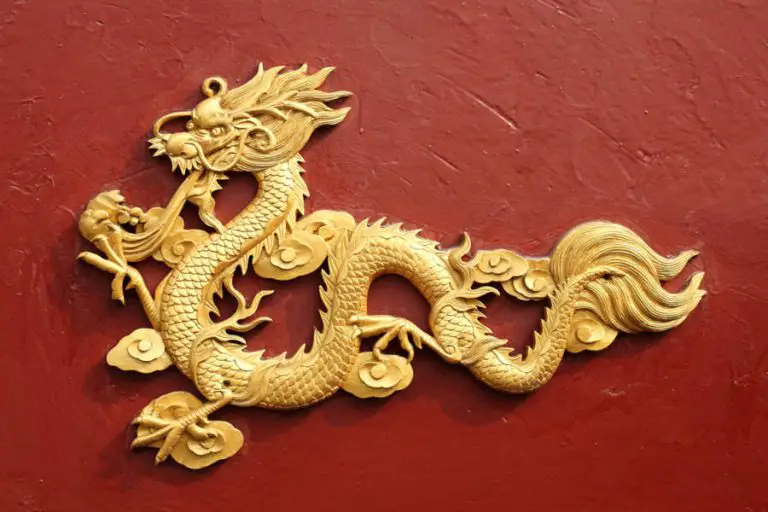Family holds a cherished position in Chinese culture, serving as the cornerstone of society and the bedrock of values and traditions passed down through generations. In this article, we delve into the profound significance of family in Chinese culture, exploring its central role in shaping social dynamics, preserving cultural heritage, and fostering intergenerational harmony.
From the Confucian principles of filial piety to the cherished rituals that strengthen familial bonds, we embark on a journey to uncover the rich tapestry of familial relationships in Chinese society.
Foundation of Society
The family stands as the cornerstone of Chinese society, anchoring its social fabric with deep-rooted values and traditions. From time immemorial, it has been the fundamental unit, essential for social organization, support, and individual identity.
In Chinese culture, the family serves as more than just a group of individuals living under one roof; it’s a cohesive entity that provides emotional, financial, and social support to its members. Within this framework, each family member plays a distinct role, contributing to the collective well-being and success of the unit.
Confucian teachings further underscore the paramount importance of the family in Chinese society. Confucius, the influential philosopher of ancient China, emphasized the family as the foundation of moral values, social order, and intergenerational harmony. According to Confucian ideology, cultivating virtue within the family unit is the cornerstone of building a harmonious society.
“In Chinese culture, the family is not just a unit; it’s the very fabric that holds society together. It’s where we learn our values, our ethics, and our sense of identity.” – Mei Lin, Cultural Historian
Filial Piety
Filial piety, also known as “Xiao”(孝), is highly valued in Chinese culture, representing great respect, obedience, and care for one’s parents and elders. This ancient virtue forms the bedrock of familial relationships, guiding behaviors and attitudes towards the older generation.
At its core, filial piety emphasizes the importance of honoring and supporting one’s parents throughout their lives. It encompasses not only tangible acts of caregiving but also intangible expressions of respect and gratitude. From fulfilling familial duties to showing deference in speech and action, filial piety permeates various aspects of daily life in Chinese society.
However, filial piety extends far beyond immediate family obligations. It encompasses a broader reverence for ancestors and a deep-seated loyalty to one’s lineage. Ancestors hold a revered status in Chinese culture, with families often maintaining ancestral altars or participating in rituals to honor their memory. By honoring their ancestors, individuals uphold a sense of continuity and belonging, acknowledging the sacrifices and contributions of those who came before them.
Loyalty to one’s lineage is another dimension of filial piety, emphasizing the importance of preserving family traditions and values across generations. Through adherence to ancestral customs and teachings, individuals strengthen the bonds that unite past, present, and future generations, fostering a sense of identity and belonging within the family unit.
In essence, filial piety serves as a guiding principle that transcends familial obligations, instilling a sense of reverence, gratitude, and duty towards one’s parents, ancestors, and lineage.
“Filial piety is more than just a duty; it’s a virtue that defines our relationships and responsibilities within the family. It’s about showing respect, obedience, and care for our parents and elders.” – Dr. Zhang Wei, Confucian Scholar
Principles of Filial Piety (Xiao – 孝) in Chinese Culture
| Principle | Description | Examples |
|---|---|---|
| Respect | Demonstrating reverence and deference towards parents and elders. | Addressing elders with proper titles, listening attentively to their advice. |
| Obedience | Following the guidance and instructions of parents and elders. | Abiding by parental rules and decisions, seeking their approval before major decisions. |
| Care | Providing physical, emotional, and financial support to parents and elders. | Assisting with daily tasks, spending quality time with elders, ensuring their well-being. |
| Reverence for Ancestors | Honoring the memory and legacy of ancestors through rituals and traditions. | Maintaining ancestral altars, participating in ancestor worship ceremonies. |
| Loyalty to Lineage | Preserving family traditions, values, and heritage across generations. | Upholding family customs and rituals, passing down ancestral knowledge and stories. |
Multigenerational Living
For many Chinese families, the concept of home extends beyond just a physical space. It’s a place where generations come together to share not just a roof, but a life. Traditionally, multigenerational living arrangements have been the norm, with grandparents, parents, and children coexisting under one roof. This practice offers a multitude of benefits for all members of the family.
One of the biggest advantages is the strong sense of mutual support it fosters. Grandparents can provide childcare and help with household chores, freeing up time for younger parents to work or pursue their own interests. In turn, adult children can offer practical and emotional support to their aging parents, ensuring they are well cared for. This shared responsibility creates a strong safety net for everyone in the family.
Research suggests that multigenerational living can also have positive effects on the cognitive health of older adults. A 2020 study published in the “Journals of Gerontology” found that grandparents who lived with grandchildren experienced a slower decline in cognitive function compared to those who lived alone.

Multigenerational living also facilitates the transmission of cultural values and traditions. Grandparents often play a vital role in passing down knowledge, stories, and customs to the younger generations.
Sharing meals together, celebrating holidays, and participating in family rituals all contribute to a strong sense of cultural identity. Children have the unique opportunity to learn from the experiences and wisdom of their elders, fostering a deep connection to their heritage.
While the trend of multigenerational living may be shifting slightly in modern China due to factors like urbanization and nuclear family structures, the underlying value of family unity remains strong.
Benefits of Multigenerational Living in Chinese Culture
| Benefit | Description |
|---|---|
| Shared childcare and eldercare | Grandparents can help with childcare, freeing up time for parents. Adult children can provide care and support for aging parents. |
| Emotional support | Strong family network offers a sense of belonging and security for all members. |
| Shared responsibilities | Financial resources and household chores can be shared, reducing burdens on individuals. |
| Cultural transmission | Grandparents play a vital role in passing down traditions, stories, and values to younger generations. |
| Stronger social connections | Creates a larger support system for social interaction and emotional well-being. |
Related reading: Innovation Through the Ages: Unraveling the Timeline of Chinese Inventions – Opens in new tab
Family Bonds and Rituals
In Chinese culture, family bonds are not only cherished but actively strengthened through a rich set of rituals and traditions. These practices serve as threads that weave generations together, fostering a sense of unity, cohesion, and continuity across time.
Perhaps the most iconic example is the grand celebration of Chinese New Year. This joyous occasion is synonymous with family reunions. Families travel long distances to come together, enjoy festive meals, and celebrate new beginnings. Sharing traditions like exchanging red envelopes and lighting firecrackers reinforces the importance of family and togetherness.
Another significant ritual is Tomb-Sweeping Day, a time for families to pay their respects to ancestors. Visiting ancestral graves, making offerings, and cleaning the area demonstrate filial piety and reverence for those who came before. This act of remembrance not only honors the past but also strengthens the sense of belonging to a larger family lineage.

Beyond these major holidays, countless smaller rituals also play a significant role. Ancestor worship, practiced by many families, involves making offerings of food and honoring the memory of deceased relatives. These rituals serve to bridge the gap between generations, fostering a sense of continuity and reminding younger family members of their lineage and heritage.
Family gatherings, held for birthdays, weddings, or simply to celebrate milestones, are another way families come together. These gatherings are not just about the food, but about strengthening bonds through shared laughter, conversation, and a sense of belonging. Filial piety ceremonies, such as those celebrating a parent’s birthday or honoring their achievements, further solidify the importance of respect and care for elders within the family unit.
These traditions, big and small, create a powerful sense of shared identity and purpose. They act as a glue that binds families together, fostering unity, cohesion, and a sense of belonging that transcends generations.
The positive impact of family rituals on younger generations is also noteworthy. A 2002 study in the “Journal of Family Psychology” suggests that adolescents who participate in regular family rituals report higher levels of life satisfaction and social competence.
Key Festivals and Family Rituals in Chinese Culture
| Festival / Ritual | Significance | Traditional Customs and Rituals | Role of Family Gatherings |
|---|---|---|---|
| Chinese New Year | Marks the beginning of the lunar new year and is the most important festival in Chinese culture. | Reunion dinner on New Year’s Eve, giving red envelopes (hongbao) with money, lion and dragon dances, fireworks. | Family members gather for a reunion dinner, exchange gifts and hongbao, and participate in various festive activities. |
| Tomb-Sweeping Day | Honors ancestors by cleaning and sweeping their gravesites, offering food and burning incense as a sign of respect. | Cleaning and tidying gravesites, offering food and burning incense, paying respects to ancestors. | Families visit ancestral gravesites together, pay respects to ancestors, and reminisce about family history. |
| Mid-Autumn Festival | Celebrates the harvest season and the full moon, emphasizing family reunions and the sharing of mooncakes. | Eating mooncakes, admiring the full moon, lighting lanterns, performing dragon and lion dances. | Families gather for a reunion dinner, admire the full moon together, and enjoy mooncakes and other festive foods. |
Related reading: How Chinese Family Values Shape Personal Development – Opens in new tab
Evolving Dynamics
In the midst of rapid urbanization, globalization, and social change, the dynamics of family structures and relationships in modern Chinese society are undergoing significant transformations. These shifts reflect the evolving landscape of contemporary life and pose both challenges and opportunities for traditional values and practices.
Urbanization has led to profound changes in family structures, with many individuals migrating from rural areas to cities in search of employment and better opportunities. Due to this, smaller families are more common now, with fewer extended families living together. This change has changed how families usually work and how family members interact with each other.
Globalization has also exerted its influence on Chinese families, exposing them to diverse cultures, values, and lifestyles. With increased connectivity and access to information, younger generations are embracing new ideas and perspectives, challenging conventional norms and traditions. This cultural exchange has led to a blending of traditional and modern influences, shaping the identity and outlook of contemporary Chinese families.
Amidst these changes, traditional values of family loyalty and filial piety remain deeply ingrained in Chinese society, serving as guiding principles for interpersonal relationships and familial responsibilities. However, the interpretation and practice of these values have evolved in response to modern challenges and opportunities.

In the face of societal pressures and economic demands, families are redefining notions of filial piety and caregiving, adapting to new roles and responsibilities. While respecting elders and upholding family honor remain paramount, contemporary Chinese families are navigating the delicate balance between tradition and modernity, seeking innovative solutions to meet the evolving needs of their members.
Moreover, advancements in technology and communication have facilitated greater connectivity among family members, transcending geographical barriers and fostering closer relationships. From video calls to social media platforms, technology has become a vital tool for maintaining familial bonds and staying connected across distances.
In essence, the evolving dynamics of family structures and relationships in modern Chinese society reflect a complex interplay between tradition and modernity. As families navigate the challenges and opportunities of the contemporary world, they continue to draw strength from their cultural heritage while embracing the opportunities for growth and adaptation in the ever-changing landscape.
“As Chinese society evolves, so too do our family dynamics. Urbanization and globalization have brought new opportunities and challenges, reshaping how we define and experience family. Yet, at the core, our values of loyalty and respect remain unchanged.” – Professor Chen Ming, Sociologist
Comparison of Traditional vs. Modern Family Structures in China
| Feature | Traditional Family | Modern Family |
|---|---|---|
| Household Composition | Extended family (multiple generations living together) | Nuclear family (parents and children) |
| Living Arrangements | Multigenerational households | Independent households (may live geographically distant from parents) |
| Division of Labor | Shared responsibilities across generations | Specialized roles, often with working parents |
| Communication Style | More hierarchical, with respect for elders | More egalitarian, with open communicationpen_spark |
End words
The landscape of the Chinese family is constantly evolving. Modern life, with its emphasis on urbanization and individual aspirations, presents both challenges and opportunities for families to maintain their strong bonds. However, the core values of respect, care, and shared responsibility that have underpinned Chinese families for generations remain remarkably resilient.
Whether through traditional rituals or new forms of connection, Chinese families continue to find ways to foster unity, transmit cultural heritage, and create a safe haven for their members. As China continues to change, the enduring strength of family will undoubtedly remain a constant source of support and a cornerstone of its vibrant society.
Related reading: The Importance of “Guanxi” 关系 (Relationships) in Chinese Society – Opens in new tab
An Introduction to Chinese History & Culture (Aff.link)
Dive into China’s rich past and intriguing present! From ancient dynasties to modern powerhouses, uncover Chinese culture facts, pivotal moments, and the captivating tales that have shaped this vast nation.
Sources
- Lee H, Ryan LH, Ofstedal MB, Smith J. Multigenerational Households During Childhood and Trajectories of Cognitive Functioning Among U.S. Older Adults. J Gerontol B Psychol Sci Soc Sci. 2021 Jun 14;76(6):1161-1172. doi: 10.1093/geronb/gbaa165. PMID: 32951054; PMCID: PMC8200351.
- Dawn Goettler Eaker, Lh Walters (2002). Adolescent satisfaction in family rituals and psychosocial development: A developmental systems theory perspective. Journal of Family Psychology. DOI:10.1037//0893-3200.16.4.406
- Yang Y, Wang C. Research on the effects of family rituals on subjective well-being of Chinese college students. Curr Psychol. 2022 Nov 9:1-15. doi: 10.1007/s12144-022-03858-6. Epub ahead of print. PMID: 36406858; PMCID: PMC9645319.
Stay in Touch
 Join our newsletter by using the forms on this website or click here!
Join our newsletter by using the forms on this website or click here! Follow us on Google News
Follow us on Google News Follow us on Facebook
Follow us on Facebook
Feature Image from Depositphotos






